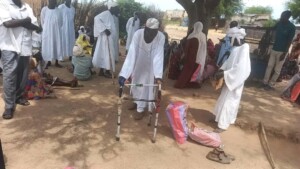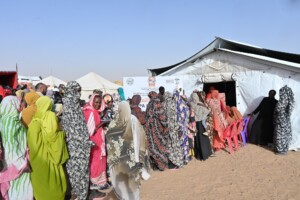Op-ed: Unamid presence is desperately needed in Darfur
“Humanity will not enjoy security without development, it will not enjoy development without security, and it will not enjoy either without respect for human rights. Unless all these causes are advanced, none shall succeed.” – Kofi Annan
 Unamid convoy in North Darfur (Mohamad Almahady / Unamid)
Unamid convoy in North Darfur (Mohamad Almahady / Unamid)
Before I embark on proposing my ideas regarding the fundamental need for Unamid in Darfur, here are powerful words from former UN Secretary-General Kofi Annan:
“Humanity will not enjoy security without development, it will not enjoy development without security, and it will not enjoy either without respect for human rights. Unless all these causes are advanced, none shall succeed.”
In his response about the Unamid’s exit from Darfur, a community leader of an Internally Displaced Persons (IDPs) camp, Sheikh Ali Ibrahim Al-Tahir of Kalma, said to me: “as long as there is cloud, rain will come.” His statement meant that Unamid’s presence is far better than its absence. His argument is all about protection and survival. This resonates with the immediate issues facing IDPs: survival and protection. According to Dennis McNamara, former Director of the UN Internal Displacement Division, protection remains a major concern. It is a highly sensitive issue due to the emphasis on national sovereignty. According to the theory of protracted social conflict, a person’s basic human needs must be met in order for resolution to be possible.
Darfuris, particularly IDPs and the urban population, are feeling very worried about the news that Unamid is leaving Darfur amid increased attacks against civilians. Their fears stem from the recent past of the Janjaweed militia killing their families, burning their villages, and looting their properties, among other hostilities committed in the absence of the international community. Their fears are also based on analysis of the current political situation. The IDPs, ordinary citizens, and other Unamid beneficiaries all feel the same – that there has not been any significant change in Darfur-Sudan. The people live in fear. An activist described the situation saying: “Darfur is not really lacking political skills. It lacks security and protection, and that is the real reality.”
Sudan is experiencing political transformation in Khartoum, regrettably not at the provincial level, and particularly not in Darfur. More must be done. IDPs and ordinary civilians both expected that the overthrow of the former dictator would bring peace, protection, and stability. Unfortunately, that is far from the case. Over the past four months, the Janjaweed militia has burned some villages in Darfur and displaced many people, a majority of whom are women, children, and elderly people. Unamid was and still is the safest place for those innocent civilians to turn to. As some IDPs are now living nearby or in surrounding Unamid compounds in different bases across Darfur.
The conflict in Darfur became widely publicized about 17 years ago, with the deaths of hundreds of thousands of innocent civilians, widespread sexual assaults, the burning of villages, and the displacement of millions of people from their homes to IDP and refugee camps. Additionally, those who found themselves in these camps were faced with very limited humanitarian services and poor security. Let me admit to you that the former Government of Sudan was the source of all this. Unfortunately, the conflict is still nowhere near an end and the suffering continues. If the conflicting parties carried out their duties and responsibilities, this could have prevented the conflict from happening and there would be no need for Unamid. Unfortunately, that wasn’t the case, and that brings us to where we are today – still mired in conflict.
Today, the armed tribal conflicts have become a major source of insecurity for Darfur’s civilian population. With the Darfur conflict now nearing almost two decades, hardly a day goes by without tribal disputes resulting in people killed or wounded. The human rights situation in the region continues to deteriorate. Civilians still bear the brunt of persistent human rights violations and other criminal acts. West Darfur has experienced the worse human tragedy since the beginning of the conflict. Not long ago on Tuesday December 31st, 2019 the militia committed extreme violence against civilian population in El-Geneina and its suburb about 53 IDPs camps and the villages either partially or completely burnt.
Recently, on April 3rd, two people were killed in Nierteti. Two more people were killed a week later near Tango village. On April 6th eight IDPs from Hamidia camp were kidnaped 18 km east of Zalingei. In a separate incident on the day, University Student Abdelmanan Abker Abdelrahman was killed between Juldo and Nierteti by armed Militia, in distinct occurrence nine IDPs were harassed and humiliated and kick out of their farms and threaten never to come back. On April 8th, the militia 7 people were robbed and beaten between Nierteti and Kabkabiya. On April 12th, more than 17 camels were abducted, On April 13th Omda Zakaria Eltahie Sharfeldien, other 13 people were injured in Sortony IDPs camps. On April 16th Mohammed Musa Abdelmula was shot and looted 8 cows at his farm near Jadah IDPs camp in Garsila. On April 18th, more than 35 cows were looted between Nierteti and Kutum. Days later on April 21st, two people were killed, nine were injured, and the village of Tamer-ball was burned. In a separate incident Mubarak Najmeldeen Mohammed was shot in Waraga northeast of Zalingei central Darfur. On April 22 Ikram Adam Elhaj was raped by Military officer, first lieutenant Abuzair Mohaamed Adam, the case number 189 was reported at Tur police station. On May 3rd at least three people were injured in an armed robbery and trucks were looted between Juldo and Umharas. Other trucks were attacked the following day. On May 6th two armed militiamen were captured while looting trucks between Juldo and Golo. In a separate incident, About 30 civilians were killed in South Darfur state in inter-communal violence on Tuesday April 6th, 2020.
The peace talks in Juba have been characterized by analysts of the Darfur crisis as having no integrity, no accountability, no transparency, no professionalism, and no objectivity. Some actors describe the talks as “peace jokes,” saying there is no difference between them and those that resulted in other failed peace agreements. Under Bashir’s rule, armed rebel groups had a common enemy – Bashir’s regime. Dozens of peace agreements were signed between the Government of Sudan and various rebel factions while he was in power. Regrettably, not even one of these agreements has brought Darfur peace or security. Instead, these unfulfilled agreements have increased the level of insecurity and created numerous fragmentations among rebel groups. Meanwhile, the social fabric of ethnic groups in the conflicting areas is being destroyed. These represent New Trajectories in a Deepening Conflict.
Unamid is needed now more than ever. The absence of Unamid will deteriorate and bring chaos to the security and humanitarian situation in Darfur, ultimately costing human lives and significant amounts of money. Why do we believe Unamid’s presence is crucial for Darfur?
- There are hundreds of thousands of IDPs in Darfur who depend on humanitarian assistance from INGOs and UN agencies; Unamid is the only force on the ground providing escorts to staff and trucks that carry food and other essential items to several IDPs camps throughout Darfur.
- Unamid provides much-needed humanitarian assessment missions to the most affected communities.
- The Government of Sudan does not monitor or report human rights violations. Without Unamid, militias will continue to attack innocent civilians and commit other crimes against humanity with impunity.
- Unamid conducts activities such as workshops and seminars that help equip local leaders with the skills and knowledge, they need to create their own problem- solving mechanisms, which can be used to address problems in their community and tribal conflicts. These Unamid-sponsored forums also help with outreach and raising awareness across different communities.
Additional Assessment of Conflict Dynamics in Darfur:
Culture of Revenge
I argue that the current Darfur conflicts could be assessed through ethnic divisions rather than political disputes. The splits in the Darfuri rebel groups quite often cause inter-rebel deadly conflict, pitting rebel against rebel. This creates a culture of revenge, which goes beyond the rebel factions to the community, family, and individual levels. The culture of revenge is a major contributing factor to the continued conflicts in Darfur. This practice of revenge also applies in cases of rape. For example, one tribe of a rape victim will attack members of the tribe of the alleged rapist. Men whose daughters have been raped identify young girls from another tribe to rape in revenge for the injuries (emotional and physical). This illustrates a dynamic of tribal action and counter-reaction. Such a dynamic is not always about sexual violence.
Proliferation of Small Arms and Open Borders
The porous border of the Darfur region is a major challenge to peace. The easy movement of individuals and groups across the border introduced gun culture, as people who have animals only feel secure when they are armed. Animals are the primary source of pride and wealth in the region, and guns constitute a symbol of protection for that wealth. To many, the absence of either of the two is a real cause of frustration and feelings of powerlessness, as they are a source of social status in society. Nomadic peoples are often perceived as a problem by the government because they own and deal with arms and pose a significant threat. Insecurity in these areas as well as civil wars in Darfur and the neighbouring countries of South Sudan, Libya, Chad, and the Central African Republic have been a main source of proliferation small arms and light weapons, making it easier for Darfuris to own arms. This inevitably has a serious effect on the region’s security situation and furthers the proliferation of small arms and the rise of gun violence.
* This article published by permission of the author.
Disclaimer: The views and opinions expressed in this article are those of the contributing author and do not necessarily reflect the position of Radio Dabanga.
 Adeeb Yousif, Ph.D. is Conflict Analysis and Resolution Scholar Practitioner. He is the Founding President of World Peace & Reconciliation (WP&R) which is a non-profit organisation that bolsters positive transformation of war-torn communities in Sudan and in other regions of the world through peace education and human development.
Adeeb Yousif, Ph.D. is Conflict Analysis and Resolution Scholar Practitioner. He is the Founding President of World Peace & Reconciliation (WP&R) which is a non-profit organisation that bolsters positive transformation of war-torn communities in Sudan and in other regions of the world through peace education and human development.
Radio Dabanga’s editorial independence means that we can continue to provide factual updates about political developments to Sudanese and international actors, educate people about how to avoid outbreaks of infectious diseases, and provide a window to the world for those in all corners of Sudan. Support Radio Dabanga for as little as €2.50, the equivalent of a cup of coffee.












 and then
and then